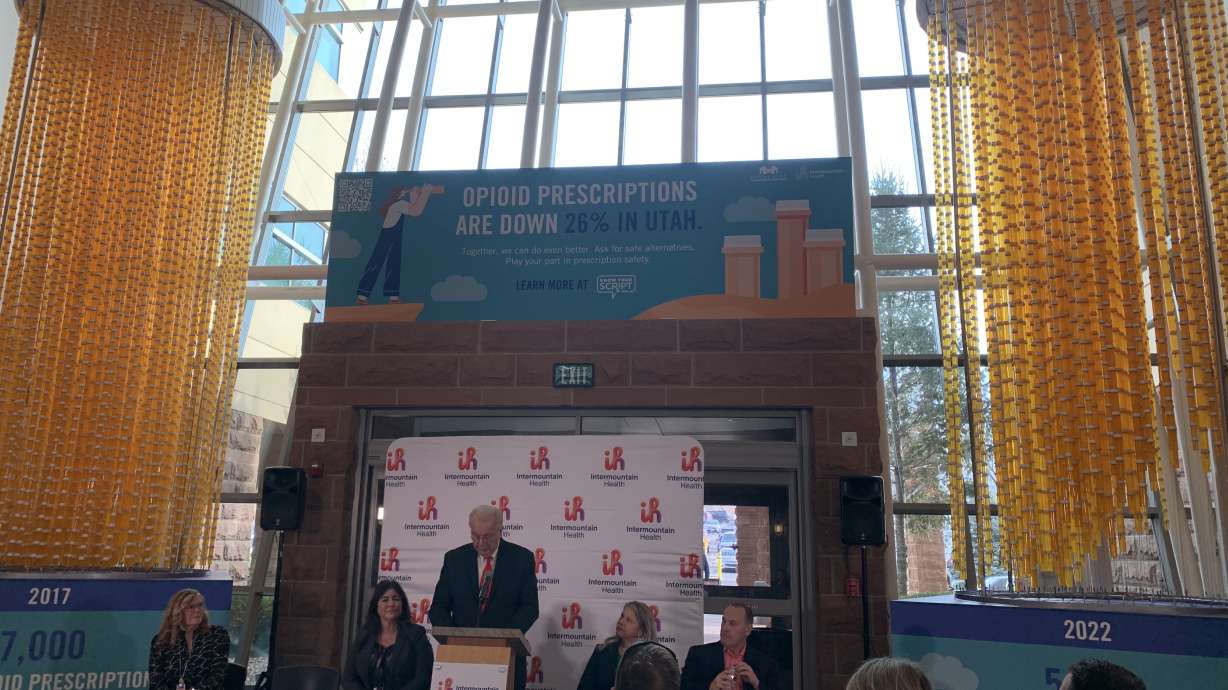Estimated read time: 4-5 minutes
This archived news story is available only for your personal, non-commercial use. Information in the story may be outdated or superseded by additional information. Reading or replaying the story in its archived form does not constitute a republication of the story.
OGDEN — Robert Hunter has spent decades reaching out to people who are dealing with opioid addiction, through running and attending addiction recovery programs.
Now he does the work to honor the legacy of his late wife, Rula Hunter, who died earlier this year after overcoming her own addiction and turning around to help others.
He said his wife was receiving treatment for back pain, and her doctor gave her a prescription for opioids in 1996 shortly after oxycodone had been introduced. Hunter, of Ogden, talked about efforts to help his wife recognize her addiction, 30 days of hospital treatment and then two years of aftercare for both of them.
He shared a letter written by one of the many people she helped recover from addiction who said he thought he had lost his wife and kids — but instead, Rula Hunter helped him find a path to a life of recovery and he later finished law school.
"I am one of the many that Rula saved, and will be eternally grateful," the man said in the letter.
Utah has decreased its opioid prescriptions significantly over the last five years, with daily prescriptions going from 7,000 to 5,200. The landmark was celebrated on Tuesday with a gathering and the installation of an art piece at McKay-Dee Hospital provided through the state program Know Your Script — two pill-bottle chandeliers, one constructed with the higher total of bottles and another with the new lower number that shows how different those totals are.
A chandelier with 7,000 pill bottles first hung in the hospital lobby in 2017; the new installation will remain in the lobby through January.
Dr. Michelle Hofmann, deputy director for the Utah Department of Health and Human Services, said the reduction in daily prescriptions is a testament to health care providers who are tackling the opioid crisis.
Intermountain Health's efforts
Kim Compagni, assistant vice president for pain management services at Intermountain Health, said in 2017 Intermountain Health noticed it was overprescribing opioids and started to take action. She said opioids have risks, and those risks can be seen in the community.
After years of learning, she said prescribing patterns have changed and people are getting the right number of tablets to relieve pain. She said Intermountain Health has decreased the number of opioids prescribed to patients by over 13 million tablets.
About 21% of adults have chronic pain in the U.S., but Compagni said there are alternative methods for managing it — including involving therapy, mindfulness, nutritional counseling and other wholistic approaches in addition to having multiple choices for pain management.
Compagni said they also considered the potency of the opioids they were prescribing and decreased the number of high-potency opioids prescribed by over 50% since 2020.
"This has been a strong commitment for us, for our patients, for our communities. We want to make sure that we are decreasing the risks for our patients (of) addiction, opioid use disorder, misuse and also overdose deaths. We are committed to making a difference," she said.
Still more to do
Alongside their efforts to reduce prescriptions, Compagni said Intermountain has promoted naloxone as a way to treat opioid overdose. She said they want it to be in every home as part of a safety kit, noting that it is safe for children and pets.
"We know we still have work to do, but we're making huge strides in this area," she said.
Hofmann said the Utah Department of Health and Human Services will continue working with partners, including health care and community organizations, to reduce opioid prescription misuse.
"Reducing prescriptions is a first step in fighting the opioid epidemic. But there's more that we can do," she said.
She suggested distributing naloxone, screening for addiction, expanding treatment resources, making fentanyl test strips available and eliminating the stigma around substance addition.
Hofmann said 74% of accidental overdose deaths in 2022 involved opioids, and although the number of opioid overdoses is no longer increasing, it is also not decreasing. It has been stagnant.
She said misuse of illicit opioids is increasing, and there has been a 500% increase in fatalities related to fentanyl since 2018.
A collaborative approach
Hofmann said the collaborative partnership will need to continue to eliminate the "crisis."
"Just as we all work together to reduce prescription opioid misuse. I'm confident we can work together to reduce all opioid use, treat addiction and save lives," she said.
South Ogden Mayor Russell Porter is involved in a collaboration working to reduce opioid misuse through Know Your Script, which mirrors others around the state.
"It's people who want to make a difference individually in small ways or collectively make a huge difference," he said.
Each of the numbers, the 1,800 prescriptions not given each day, represents a person — students, parents, doctors and pharmacists making a better choice, Porter said.
Hunter said there is a stigma attached to addiction but there shouldn't be. He said although there are more tools now than when his wife was struggling with her addiction, opioid use will not be completely eliminated.
"The more we talk about it, the more help we'll get," he said. "It's simply one of those things that happens in life and we need to address it head-on and that's how we're going to get past it," he said.
He said almost every hour in Utah there is an Alcoholics Anonymous, Narcotics Anonymous or an addiction recovery meeting happening.










